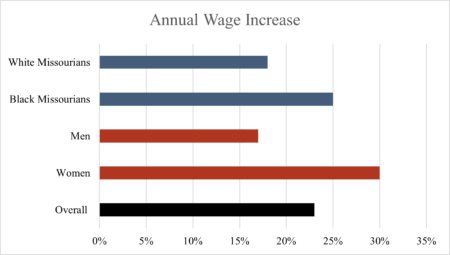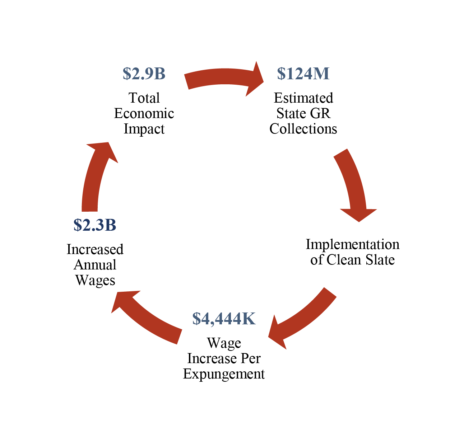Many hardworking Missourians seeking to build better lives for themselves and their families face barriers to employment due to past convictions. Despite having paid their debts to society, criminal records can reduce economic opportunity for those who have had involvement with the justice system. For many, expungement offers a second chance.
Currently, although many Missourians are eligible to have their criminal records cleared, they do not do so because the expungement process is time consuming, expensive, and difficult to navigate.
In 2021, roughly 518,000 Missourians were eligible for expungement. However, fewer than 1% of eligible individuals had their
records cleared.
Clean Slate legislation automates the criminal record expungement process, so that all eligible individuals receive the benefits of record expungement.
Economic Benefits of Clean Slate for Individuals
Making the expungement process automatic for eligible individuals ensures that they can fully participate in the economy, benefiting individuals and their families, as well as employers.
After expungement, justice involved individuals are 13% more likely to be employed and on average see a 23% increase in annual wages.

Black Missourians (who earn an average 62 cents per dollar earned by white Missourians) and Missouri women (whose annual earnings are 78.7% that of men) stand to see the largest wage increases postexpungement.
Impact on Economic Activity Across Missouri
On average, expungement is associated with a $4,444 increase in annual wages for each person impacted. These increased wages are sustained well after expungement occurs, meaning that the economic boost provided by expungement reverberates throughout the economy for years to come.
Based on the average wage increase for individuals, Clean Slate legislation would increase Missourians’ wages by an estimated $2.3 billion annually statewide.
As these dollars flow in and out of local businesses, the economic impact of these wages multiplies.
Clean Slate Would Generate $2.9 Billion in Economic Activity Annually

As a result, MBP estimates that the overall economic impact of Clean Slate in Missouri would be $2.9 billion annually.
In addition, these increased wages would generate an additional $124 million in state General Revenue each year – more than enough to pay for both upfront and ongoing costs of Clean Slate and to invest in additional services and infrastructure to support Missourians and grow our state economy.
The Cost of Clean Slate in Missouri
The bulk of the costs for Clean Slate are one-time, up-front costs related to digitizing records and the development of IT infrastructure for the automated expungement system. Once in place, automatic record clearing will reduce existing court system costs that are currently spent on processing record-clearing petitions – costs borne by taxpayers.
Eight states have already adopted Clean Slate legislation; these states have experienced only modest costs associated with implementation and have seen minimal ongoing costs.
Methodology
Statewide Wage Increase: Calculated as $4,444 increase in wages for 518,000 Missourians, less the estimated 1% currently accessing expungement.
Economic Impact: Calculated as the average of Moody’s Refundable (1.21) & Nonrefundable (1) tax rebates, Earned Income Tax Credit (1.23), and Unemployment Insurance (1.67) economic multipliers.
General Revenue: Sales tax calculated as the average Missouri GR sales tax collections as a share of Missouri wages and salaries from 2015-2023 (1.52%); Income tax calculated as the average Missouri net individual income tax collections as a share of Missouri wages and salaries from 2015-2023, adjusted for a decrease in collections due to a reduction in Missouri’s top income tax bracket to 4.8% in 2024 (3.92%).

